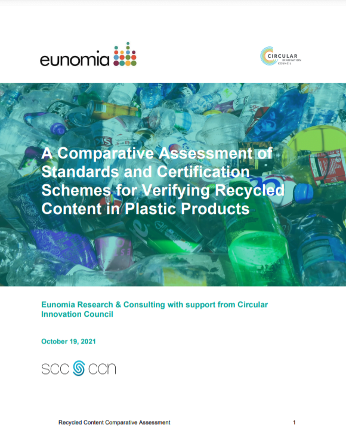Key considerations for integration of recycled content in plastic products
Eunomia consultancy carried out new research which has identified key considerations to verify recycled content claims in plastic products. The reason for the research was to inform actions in support of Canada’s target of achieving at least 50% recycled content in plastic products, where applicable, by 2030.
Currently, Canada generates approximately 3 million tonnes of plastic waste, of which 9% is recycled and represents a loss of approximately $8 billion in value to the Canadian economy. The remainder is discarded in landfills or leaks into the environment as plastic pollution, where it has caused harm to organisms and their habitats.
To address this, companies around the globe in various sectors across the economy are increasingly using recycled content and adopting voluntary recycled content targets for plastic products and packaging. As governments and industry consider actions to increase the use of recycled plastic, a critical element will be how to measure and verify recycled content in products.
To support this approach, the Standards Council of Canada (SCC) and Environment and Climate Change Canada commissioned Eunomia to carry out a comparative assessment of existing and in-development North American and international standards and certification protocols for verifying recycled content in plastic products, following which we identified needs for effective future certification programs.
The project also engaged Circular Innovation Council, which interviewed industry and government stakeholders to understand uptake and use of standards and certifications; factors influencing choice; as well as the key barriers affecting the integration of recycled content in manufacturing processes. Interviews also revealed that recycled plastic feedstocks move freely between packaging and product sectors, which underscores the need for new recycled content standards to consider the plastics economy at a macro level.
Sarah Edwards, Head of Eunomia’s Americas Office, said: “As governments and brands set recycled content targets, there needs to be clear and common rules on how compliance is measured, and traceability demonstrated through agreed chain of custody models to ensure uniformity. The landscape analysis of recycled content certification programs presented in our report provides a basis for the Government of Canada and industry to consider their approach to recycled content verification.”
The study found that use and verification of recycled content is still in its infancy and varies between resin types and product sectors. The use and choice of program also varies by industry sector and includes third-party and internally developed programs, which reflects several differences. These include definitions of key terms; acceptable chain of custody models for physical and chemical traceability; what to include in the calculation of recycled content; auditing and compliance methodology; labelling systems; and how outputs from non-mechanical recycling contribute to recycled content goals.
The study further suggests the federal government should consider setting minimum requirements for verification and reporting of recycled content that any new or existing program would have to meet to incorporate effective verification in Canada.
The report’s release comes amid a growing number of initiatives and regulations worldwide aimed at reducing plastic pollution. The focus on how to measure recycled content to ensure there is a common and fair process for doing so is being discussed in many other jurisdictions, including the European Union, which is also being supported by Eunomia to develop a general method for the calculation, verification and reporting of recycled content in single-use plastic bottles as part of the Single Use Plastics Directive.
The full report can be read on the Eunomia website.

